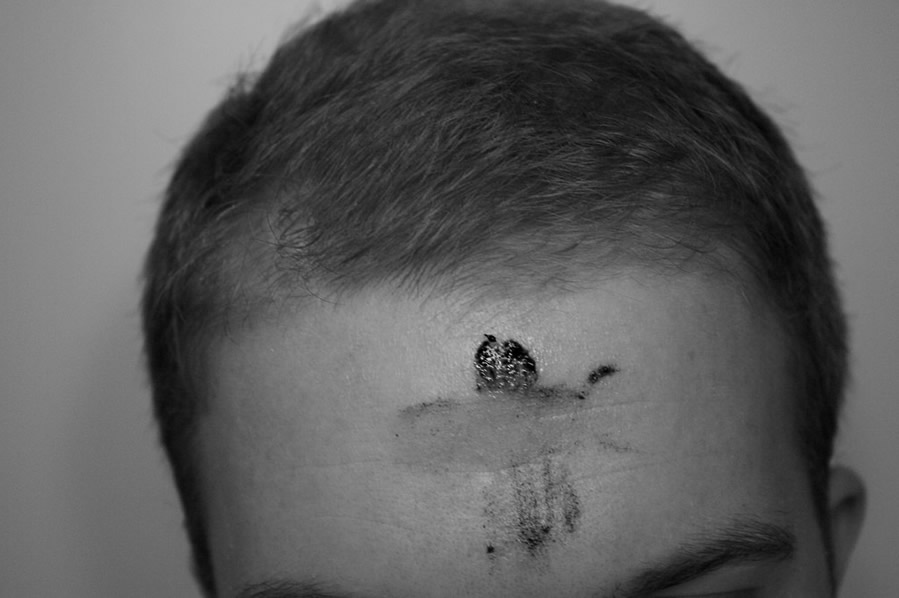
Into Lent We Go...Together
02-27-2022Pastor's LetterRev. Gregory B. Wilson, VFDear Brothers and Sisters in Christ,
Masses for Ash Wednesday, Mar 2, 7:00 am, 8:20 am, 12:00 pm, 5:30 pm, and 7:00 pm in Spanish.
“The days will come when the bridegroom is taken away from them, and then they will fast.” – St. Matthew 9:15
Into the desert we go with Jesus once again to fast and pray. Why bother? Well, Jesus did it (that should be enough reason), and He gives us instruction on how we should do it (see Matt. 6:16-18). Also, all the great Saints practiced it. “Fasting gives birth to prophets and strengthens the powerful. Fasting is a good safeguard for the soul, a steadfast companion for the body, a weapon for the valiant, and a gymnasium for athletes. Fasting repels temptations, anoints unto piety. In war it fights bravely, in peace it teaches stillness” St. Basil the Great. We get the most out of things we prepare for.
Jesus’ bride, the Church, gives us help. Here are the norms for Catholics in Lent:
Abstinence from meat: Catholics abstain from meat on Ash Wednesday and all Fridays of Lent from age 14 onwards. (There is no upper age exemption for abstaining from meat.)
Fasting: Also, Ash Wednesday and Good Friday are days of fast for Catholics. The norms for fasting are obligatory ages 18–59. Fasting means a person may eat one full, meatless meal, as well as two smaller portions that together are not equal to a full meal. If possible, the fast on Good Friday is continued until the Easter Vigil (on Holy Saturday night) as the "paschal fast" to honor the suffering and death of the Lord Jesus, and to prepare ourselves to share more fully and to celebrate more readily His Resurrection.
Those excused from fasting include the physically or mentally ill and individuals suffering from chronic illnesses such as diabetes. Also excused are pregnant or nursing women. In all cases, common sense should prevail, and ill persons should not further jeopardize their health by fasting.
The St. Paul Center for Biblical Theology is making a special, free series available to help Catholics get back to the roots of our faith in the Scriptures and the Sacraments. Journey Through Lent includes daily reflections on Mass readings with Dr. Scott Hahn, a renown biblical theologian. The series will feature faith-inspiring talks on Confession, prayer, the Most Holy Eucharist, and knowing the Gospel. Watch for free beginning Ash Wed, Mar 2. Also, everyone who registers will receive a PDF booklet of daily reflections on the Mass readings, “Journey Through Lent.”
Sign up for free at stpaulcenter.com/journey-through-lent.
Praying for a fruitful Lent for us all,
Father Wilson
Queridos hermanos en Cristo,
Misas para el Miércoles de Ceniza, 2 de marzo: 7 am, 8:20 am, 12 del mediodía, 5:30 pm y 7 pm en español.
“Pero vendrán días cuando el novio les será quitado, y entonces ayunarán.” San Mateo 9,15
Al desierto vamos con Jesús una vez más a ayunar y orar. ¿Por qué molestarse? Bueno, Jesús lo hizo (esa debería ser razón suficiente), y Él nos da instrucciones sobre cómo debemos hacerlo (ver Mateo 6,16-18). Además, todos los grandes santos lo practicaron. "El ayuno hace Profetas, anima a los fuertes. El ayuno es guarda segura del alma, y amigo fiel del cuerpo; es una armadura fuerte para los combatientes, y un ejercicio utilísimo para los atletas. El ayuno quita las tentaciones, dispone para la piedad. En las batallas pelea con determinación, y en la paz enseña el descanso." San Basilio el Grande. Aprovechamos al máximo las cosas para las cuales nos preparamos.
La novia de Jesús, la Iglesia, nos da ayuda. Aquí están las normas para los católicos en Cuaresma:
Abstinencia de carne: los católicos se abstienen de comer carne el Miércoles de Ceniza y todos los viernes de Cuaresma a partir de los 14 años. (No hay una exención de edad mayor para abstenerse de comer carne).
Ayuno: Además, el Miércoles de Ceniza y el Viernes Santo son días de ayuno para los católicos. Las normas para el ayuno son obligatorias entre los 18 y los 59 años. El ayuno significa que una persona puede comer una comida completa sin carne, así como dos porciones más pequeñas que juntas no equivalen a una comida completa. Si es posible, el ayuno del Viernes Santo continúa hasta la Vigilia Pascual (en la noche del Sábado Santo) como el "ayuno pascual" para honrar el sufrimiento y la muerte del Señor Jesús, y para prepararnos para compartir más plenamente y celebrar más fácilmente Su Resurrección.
Los que están exentos del ayuno incluyen a los enfermos físicos o mentales y a las personas que padecen enfermedades crónicas como la diabetes. También quedan exentas las mujeres embarazadas o lactantes. En todos los casos, debe prevalecer el sentido común, y las personas enfermas no deben poner más en peligro su salud ayunando.
Catholic.net está poniendo a su disposición esta Cuaresma,
dos jornadas de retiro y la oportunidad de vivir los ejercicios espirituales de San Ignacio en línea. Inician gratis a partir del Miércoles de Ceniza, 2 de marzo. Para mayor información entren a: es.catholic.net/op/articulos/52759/retiro- espiritual-de-cuaresma-y-ejercicios-espirituales-ignacianos- por-internet.html
Para registración gratis entren a: ejerciciosive.org/ courses/ejercicio-cuaresma-2022/
Orando por una Cuaresma fructífera para todos nosotros,
Padre Wilson